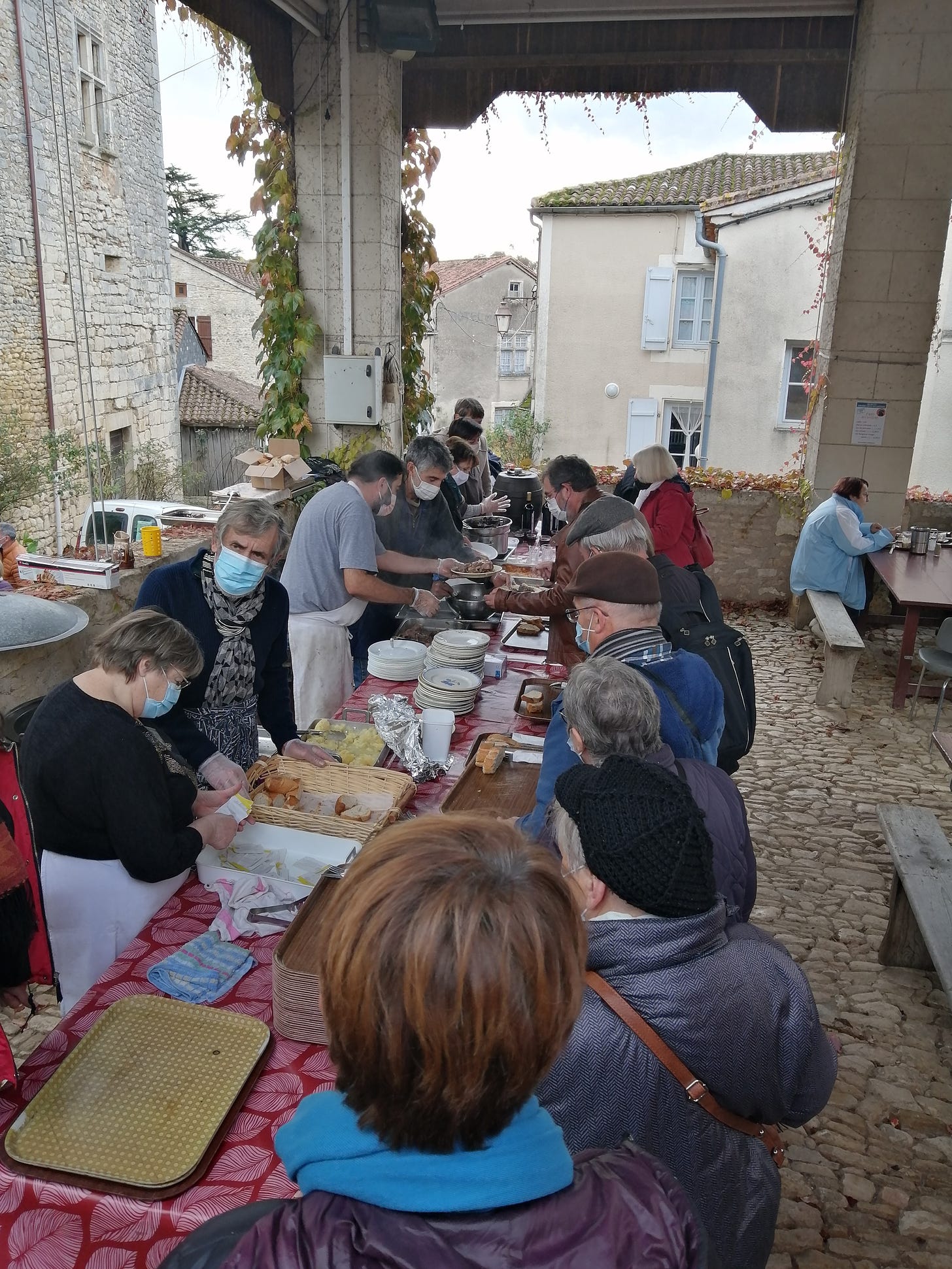A few hours ago one of our readers, Crystal, asked me:
May I ask that you fill us in, as well, during your travels and searches, on each community and areas approach to global preservation. Reduction in waste, repurposing of supplies, recycling and composting of residuals. Modes of transportation from man powered (bicycles, walking) to public transportation (buses, underground, ride sharing) and finally to their transition to electric vehicles and more Earth friendly methods of home heating. Another vision I'd love to hear note of is the support of local markets, both food and clothing, locally sourced home supplies and the reduction primarily in the visibility of single use plastic packaging. I'd be quite interested in your take from a set of eyes new as a resident coming recently from another country with a more vast and contrasting range of extremes and opinions, efforts and future prospects being put into action.
Just today, in preparation for a possible trip to Paris, I logged onto a government website to request a windshield sticker that tells how high the carbon emissions are for our 2019 Hyundai. We rated a purple sticker, the best possible below electric and hydrogen vehicles. Some high polluting vehicles are actually banned in Paris..
On the other hand diesel cars are still a big thing in France
We live in a rural location. at the end of every road are two bins: one smaller one for garbage, one big one for paper and plastic recycling. Glass though has to be taken to the bin on the outskirts of Varaigne.
France is justifiably proud of their efforts to reduce carbon emissions, but a lot of those reductions are the direct result of a heavy reliance on nuclear power generation.
In January France will ban plastic packaging on fruits and vegetables.
Farmers markets happen in every town and village, and they are truly local affairs with a quality and variety of fruits, vegetables, cheeses, sausages, and every other foodstuff that can only be imagined in Canada. And clothing. Overall the quality of food in France is an order of magnitude better than Canada, and much of it is grown very close to home.
Every village has a baker who makes bread and pastries for their neighbours, and there is almost always a butcher or charcuterie for meats. Regardless of that, our local InterMarché supermarket would put a Vancouver Whole Foods to shame.
The Foire aux Dindons last week in Varaigne drew some 15,000 to 20,000 people, had dozens of vendors, and included a very busy travelling knife sharpening service. I’m not sure that it’s even possible to get a knife sharpened in Vancouver.
On the other hand because of bird flu restrictions there weren’t actually any live turkeys this year. There was though a massive community turkey dinner.
Aside from the suburban ring around Angouleme we have not seen a single one of those mega-commercial strips that are the norm in Canada. Instead we still see all manner of local owned, local run businesses. That means a personalized level of service that Best Buy or Canadian Tire will never attain.
It’s worth noting that overall cars and trucks are much smaller, and unless I miss my guess much more energy efficient. You can be sure that you won’t see a Ford F-350 or Dodge Ram, in large part because they couldn’t possibly navigate the ancient city streets.
And of course, houses built 200, 300, or 500 years earlier will outlast anything constructed today. The French government actually delivers on programs to help home-owners to make their houses more efficient and green - the kind of promises that Canadian governments keep making, but that never seem to actually add up to anything significant.
Overall I’d say that the French have a strong sense of history, and the role that their history has played in their lives and their culture. That makes them appreciate the value of preservation and heritage in a real and impassioned way, and means that there isn’t the urge to bulldoze buildings willy-nilly.
That sense of heritage and of France’s colonial past led this year to an apology by President Emmanuel Macron to Algerians who fought alongside French colonial forces in Algeria’s war for independence, and were then massacred and ostracized as traitors. Last month France began to return artworks stolen from Benin during the colonial occupation.
And finally in terms of local versus international juggernauts, France has imposed a minimum charge for the delivery of books. This is explicitly intended prevent Amazon.com from offering free delivery. That means that the thousands of local bookshops are competing on a level playing field.
At the end of the day I’d say that France is well ahead of Canada in terms of being really green and local. Some of that is a French thing, and a lot of that is the larger European Union rules. All in all I feel that it is better here.








Incredible answer and I appreciate your expedient response as it represents your own continuous research as you make these conscious life decisions! There were tears slipping down my face, some in such absolute joy for Europe, in particularly France. This backs up all that I have seen amidst my friends that live there. The remainder of my tears were in travesty for Canada. We live in a place where climates create complications such as frost and snow, increasing the maintenance and building costs for public transit such as overhead, on land or even underground trains. The costs for tickets would be excruciating in order to build and maintain unless they could guarantee daily long distance travel numbers akin to Asia's city numbers. We couldn't even sustain a public bus transport system any longer as years grew, fears grew, weather and distance created delays and it would take 18 hours and a few transitions to get someplace that would take 5 hours by vehicle. Even then, people were willing to complete the 18 hour sojourn for environmental footprint reductions had it not meant an additional 3 days round trip being required off work for the purpose of travel. There is a great deal of logic in the why certain things DON'T work here that DO work there. Engineers are planners are constantly working on the conundrum, dedicated to "one day". Perhaps other countries in similar elevation locals, similar Northern townships ... perhaps our next generation will resolve the complications we ourselves have yet to.
Still, I weep as we have local farmers that could become far more independently affluent if everyone would shop local. Would we still have to import lettuce and fruit, etc.? Grandma and Grandpa didn't. They ate fresh in summer, harvested with joy and relish in Autumn and lived from preserves and freshly hunted game through winter. Clothing was most often second hand or homemade. Cooking and baking was done at home. Jobs were filled by the locals. People had credit at the grocer or perhaps at the blacksmith or the mill for a handshake in a pinch. You built your own homes, homes of wood or sod as stone wasn't plentiful in the west for proper Mason work. A fireplace, sure. An entire home? Go East, young man. Here in the West, trees were more plentiful than stone. A necessary home could be put up in a couple of days by a homeowner and their neighbours. Wooden homes were easier to heat on less. It made sense.
Yet I also weep for what you say about abandoned buildings put up quickly in construction and industry booms, outgrown and moved out of, left empty to grow rusty in metals and rotten in woods. Regular maintenance in our weather a must. It causes my heart to sorrow every time I walk or bike past a building left empty or being torn down. Its walls speak of a day when it once shone and its purpose, just like every man, woman and child's, was clear, now grown cold, neglected, unused, not as good as the next thing.
I wish politics and finance weren't such complex issues for the world to agree upon. I dare say we have all the answers and all the proper financing for every country, every neighbourhood, every community be as wondrous as what you're seeing there, every solution at our noses ... if we could all stop fighting over every penny, whether it be mine or yours.
Ahhhh, but I suppose mankind wasn't every made to be so easy.
I appreciate your efforts. You're making a difference. Carry on. As always, carry on.